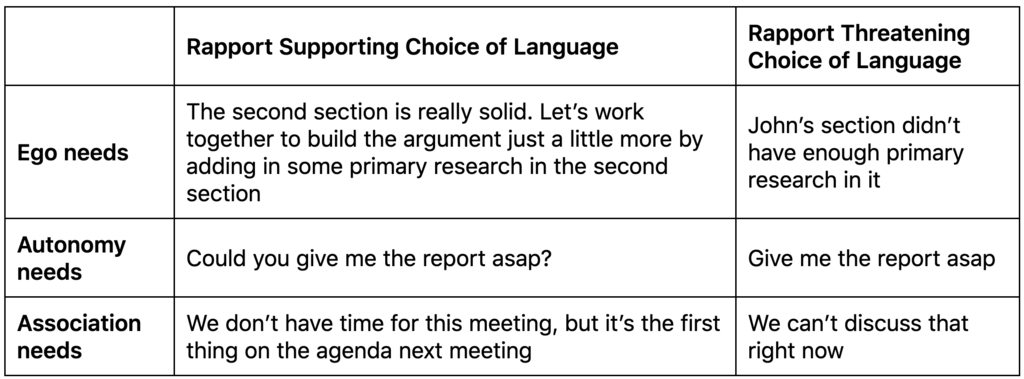
Professor Kim Sydow Campbell has conducted a range of research studies over the years on Leader Rapport Management. In her recently published co-authored study[1], she explores its impact on social loafing in student teams (i.e. not participating actively) and also examines the potential influence of some intermediary factors.
Here are some of her key findings:
- Greater Leader rapport management → less social loafing
- Greater Leader rapport management → better communication quality → less social loafing
What is ‘Leader rapport management’?
Campbell and her colleagues have used the following definition of rapport:
“rapport is defined as the level of relatedness felt between participants in an interaction.”
Drawing on work in pragmatics, including my own (e.g. Spencer-Oatey, 2008[2]), she and her colleagues identified three key factors that reflect a leader’s management of rapport:
- Attention to team members’ ego needs (i.e. manage people’s concerns that their self-image be respected – what is widely referred to as face)
- Attention to team members’ autonomy needs (i.e. manage people’s desire that their independence/autonomy be respected)
- Attention to team members’ association needs (i.e. manage people’s desire that relevant others give them appropriate time and attention)
The authors point out that leaders can manage or mismanage rapport through the way that their choice of language addresses or fails to address each of these needs. They give the following examples of possible leader communication to illustrate how this can occur in interaction in the USA.

As mentioned, the authors found that the more rapport-supportive a leader’s language was, the more it reduced social loafing by team members.
Communication Quality
The authors also collected measures of communication quality within the team, covering the following aspects: quality and appropriateness of group discussions, accuracy and richness of information conveyed/received, and openness/ease of communication. They found that Leader Rapport Management affected level of Communication Quality and that Communication Quality in turn affected the extent to which team members engaged actively in the team project.
Take-away thoughts
Like all research, this study had a number of limitations, including that the participants were all US university students. More research is needed to examine the impact of the probed variables in workplace contexts and in different cultural settings. For example, the relative importance of autonomy needs and association needs is likely to vary across cultural groups. Moreover, what constitutes rapport-supportive or rapport-threatening wording is likely also to be highly culturally variable.
Nevertheless, I believe that the paper usefully draws attention to the following:
- The need for a usable framework for conceptualising rapport
- The importance of enhancing Leader Rapport Management
- The interconnections between language wording and rapport management
What is needed is more research into these issues, including what happens in intercultural interaction. There tends to be a lot of single culture studies (like this one) as well as a lot of cross-cultural/comparative studies, but much less on intercultural interaction. Daniel Kádár and I tried to address this in our recent book Intercultural Politeness: Managing Relations across Cultures, Cambridge University Press, 2021, which specifically addresses the issue of rapport management in intercultural contexts. It is not limited to leader rapport management and includes both an evaluation angle (i.e. how we judge others and their behaviour) as well as a performance angle. However, there is a great need and much scope for more work in this area.
Professor Helen Spencer-Oatey, Director
References
[1] Lam, C., & Campbell, K. S. (2021). Follow the leader? The impact of leader rapport management on social loafing. Business and Professional Communication Quarterly, 84(3), 181–204.
[2] Spencer-Oatey, H. (2008). Face, (im)politeness and rapport. In H. Spencer-Oatey (Ed.), Culturally Speaking. Culture, Communication and Politeness Theory (pp. 11–47). London: Continuum.

